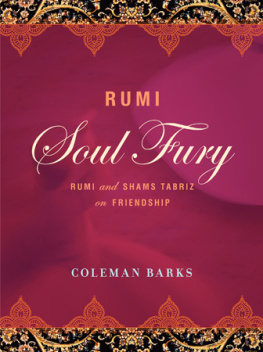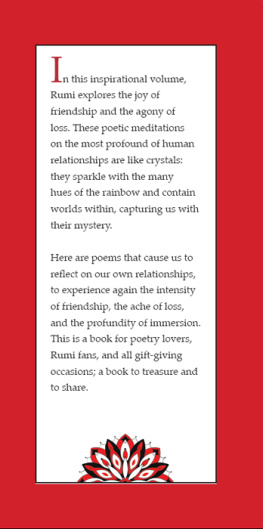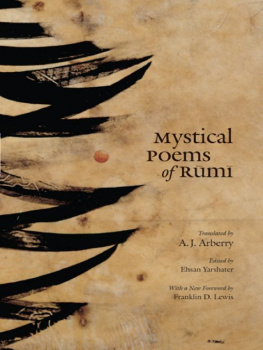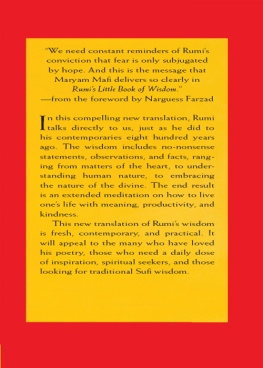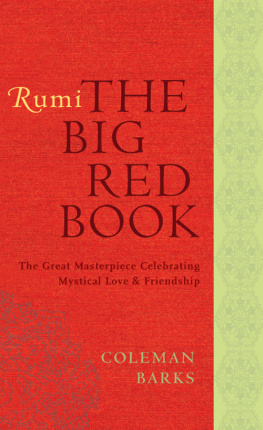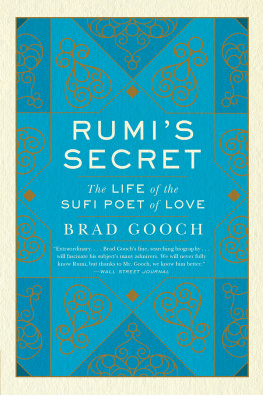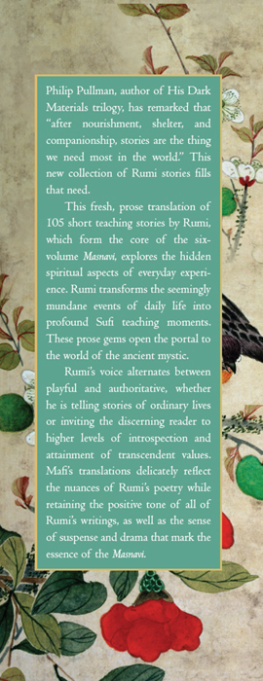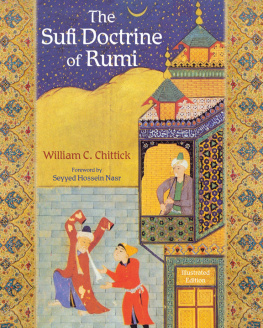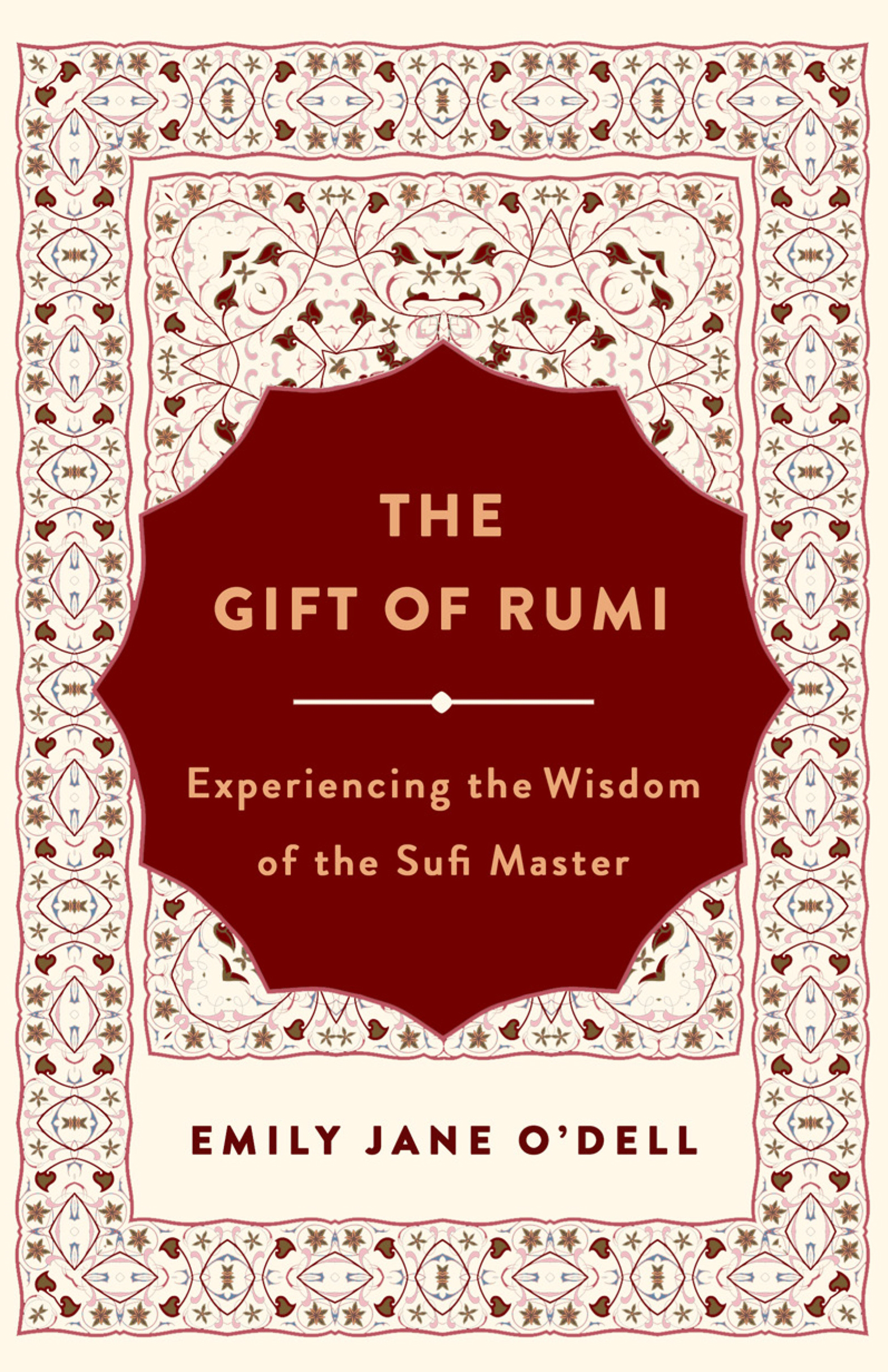Contents
Guide
Pagebreaks of the print version

The author and publisher have provided this e-book to you for your personal use only. You may not make this e-book publicly available in any way. Copyright infringement is against the law. If you believe the copy of this e-book you are reading infringes on the authors copyright, please notify the publisher at: us.macmillanusa.com/piracy.
This book is dedicated to your yearning heart
Mawlana Jalal al-Din Muhammad Balkhi (12071273), more commonly known in the West as Rumi, was a brilliant poet and celebrated mystic from the thirteenth century, whose lyrical and ecstatic articulations of divine love have touched and inspired hearts around the world since medieval times until the present day. Born in Central Asia, Rumi migrated west with his parents as a boy to Anatolia during a period of extreme regional instability and uncertainty due to the ongoing Mongol invasions and local power struggles. Though Rumi has been lauded as a best-selling poet in America for decades and many have heard of his message of love, the mystical meanings and spiritual contexts of his poems have been crying out for more attention.
Many people today are hungry for spiritual nourishment and in search of something greater than themselves. The usual uncertainties and anxieties of life have been compounded by the recent tumult of political events and the carnage of an ongoing global pandemic. Life as we knew it has been upended. Caught between the crushing waves of rising intolerance and mass death, many souls across the world are seeking to soothe their sorrow, anger, and alienation in this unjust world that glorifies materialism and worships wealth above all else. Rumi, whose own day was marked by violent chaos and mass death, offers us a portal out of our despair. He invites us to: Rise from the plague of hypocrisy and deprivation, and enter the world of life and self-subsistence. Through his celebrated verse, Rumi gently guides us to become free from our attachments to the material realm and our own self through reflection, devotion, and the overpowering force of love. A touch of insanity doesnt hurt, either!
In his poetry, Rumi frequently refers to Islamic mysticism, or Sufism, as the way or the path that leads away from worldliness toward the divine realm. Sufism is the road of love that a yearning heart takes in its journey toward truth. It is a mystic path tread by spiritual wayfarers with polished hearts and perfected virtue who strive in every momentwith each breathto experience divine love. Rumi does not only use the words Sufi and dervish for Muslim mysticshe also calls them the dear ones, the poor ones, the lovers, the people of purity, the friends, the wanderers, the freed ones, the aware ones, the knowers of God, the people of the heart, and those who are truly existent. A mystic master himself, Rumis exemplary spiritual life and visionary poetry exude the compassionate spirit of religious tolerance, celebrate the healing power of the creative arts, and unveil the heights of spiritual ecstasy and transcendence. To uncover the deeper meanings of Rumis poetry, this book contextualizes his exalted verses in the essentials of Islamic mysticism.
What is the gift of Rumi? The gift of Rumi is, first and foremost, love. Rumi was a mystic preacher of love who professed the healing and transformative power of love. He was a poetic master who beautifully captured the sweet pain of the hearts yearning for greater intimacy with the divine. At the core of Rumis mystical poetry is the religion of love, which transcends all religions. As Rumi wrote: The religion of love is separate from all religions. For lovers, the only creed and doctrine is God. A devout Muslim, Rumi refers to God in his poetry as the belovedthe source of love itself. Through his majestic verses of ecstasy and longing, Rumi invites us into the religion of the heart and guides us to our own loving inner essence. His playful and profound articulation of the souls journey back to its pure nature and loving source is a gift to all humanity.
Rumis given name was Muhammad. The honorific, Jalal al-Din, given to him by his father, means Splendor of the Faith. Arabic, Persian, and Turkish speakers in the past and present do not refer to him as Rumi. Rather, they call him Mawlana or Mevlana, which means Our Master or Our Teacher. The moniker Rumi means The One from Rum, with Rum referring to Byzantium, the eastern half of the Roman Empire, which included the territory of modern-day Turkey, where Rumi lived for most of his life. The nickname Rumi gained currency in the 1920s and 1930s, as a result of its usage and propagation by western Orientalists. Rumi is buried in Konya, which during his life was the capital of the Seljuk Sultanate of Rum in south-central Turkey.
As Rumi wrote mainly in Persian, his poetry has been recited through the centuries by Persian speakers in what is modern-day Iran, Afghanistan, Tajikistan, and Uzbekistan, as well as the Indo-Pakistan subcontinent. All along the Silk Road, Muslims for centuries have sung his poems in many different languages as lyrics for their traditional music genres and formssuch as qawwali in India and Pakistan and shashmaqam in Central Asia. Rumis poetry still plays a central function in the lives of millions of Muslims around the world. In fact, in his poems he references geographies far and wide with allusions to Egypt, Yemen, Iran, Turkey, Uzbekistan, Kazakhstan, China, Syria, Iraq, India, Oman, and beyond. Rumis poetry, in the past and present, has influenced and inspired writers in many languages, such as Arabic, Persian, Urdu, Hindi, Pashto, Turkish, Tamil, Gujarati, and Chinese. Rumi also knew Arabic, and he wrote hundreds of poems in Arabic, too.
Rumi was a revered Muslim scholar, jurist, and mystic. As a Muslim, he observed the five pillars of Islamthe profession of faith, the daily prayers, the giving of charity, the fasting of Ramadan, and the pilgrimage to Mecca. He was a Sunni Muslim who practiced Islamic mysticism, and he followed the Hanafi school of Islamic jurisprudence. His father, Baha al-Din Walad, was also a respected Muslim preacher, theologian, and scholar of the Quran. In the words of Rumis spiritual master, Shams of Tabriz, the Quran is the Book of Love. Rumi draws frequently from the Quran in his poetic masterpiece, The Masnavi, which explores the spiritual journey of a soul returning to its source through a variety of tales and Quranic allusions. However, in many popular English translations of Rumis verse, a significant portion of Islamic references have been left out.
Some of the selections in this book come from The Masnavi, which Rumi described as the roots of the roots of the roots of religion and the explainer of the Quran. Many have called his six-volume masterpiece with over 25,000 verses the Quran in the Persian language. Perhaps no other text apart from the Quran, the holy text of Islam, which was recited by the Prophet Muhammad in Mecca and Medina in the seventh century, has so influenced the lives of Muslims around the world as Rumis Masnavi. As Rumi explains: My Masnavi is the shop for unityanything that you see except the One is an idol. Rumi also wrote sermons and thousands of odes and quatrains, a number of which are also featured in these pages.
Rumis verses of love and spiritual ecstasy have resonated with countless hearts around the world through translation, but his poetry in the original Persian is even more dazzling than most people realize. Many of Rumis poems are so spiritually deep (the words and meanings can be translated in a multitude of ways) that native speakers of Persian can debate for hours, days, and even weeks about just one verse or even one word. A significant amount of Persian scholarship on Rumi is still not translated into English, and a large portion of his own oeuvre has not yet been translated into English.


